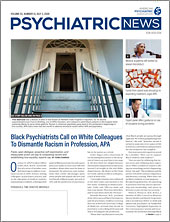The National Institute of Mental Health (NIMH) recently held a webinar that addressed a new and distressing trend: the increasing rate of suicide among Black youth.
According to NIMH, Black youth under age 13 are twice as likely to die by suicide as their white peers, and the suicide death rate among Black youth has been increasing faster than in other racial/ethnic groups.
“Quite frankly, I’m alarmed,” said Michael Lindsey, Ph.D., M.S.W., M.P.H., one of the participants. “I’m scared for a lot of Black kids and their families, because suicide has somehow become an option for how they reconcile their emotional, psychological pain.”
The webinar was part of the NIMH Office for Disparities Research and Workforce Diversity webinar series and was held in association with the Office of Behavioral Health Equity at the Substance Abuse and Mental Health Services Administration.
In an interview with Psychiatric News, Tresha Gibbs, M.D., a member of APA’s Council on Children, Adolescents, and Their Families, said psychiatrists must work to help Black youth, particularly during the pandemic and especially due to these disturbing trends. Gibbs is also the medical director of outpatient psychiatry at the New York City Children’s Center.
“In our field, we help people maintain hope and strengthen their resiliency,” Gibbs said. “Let’s focus in and help more Black youth survive to see adulthood. Let’s create a better world for them so it’s a world they want to live in.”
Risk Factors Outlined
The webinar participants pointed to a variety of risk factors for suicidal ideation and behavior among Black youth, such as depression, anxiety, and attention-deficit/hyperactivity disorder, as well as family conflict. Black youth in particular may not have access to treatment and are more likely to experience discrimination, the participants said.
Unfortunately, the media amplifies and reinforces negative images of Black youth, explained Michelle Durham, M.D., M.P.H., an assistant professor of psychiatry at Boston University School of Medicine.
To adults, Durham explained, news reports involving discrimination and racism are painful, so imagine school-age youth who are still in the developmental stages of childhood hearing, seeing, and being confronted with these images. “It sends a message that maybe ‘I’m not good enough, that I’m not accepted, I’m bad, I’m not wanted,’ ” she said.
Compounding the problem are huge gaps in access to care for Black youth and lack of diversity within the mental health workforce. “We don’t want to have to explain to a health professional what it feels like to be discriminated against,” Durham said.
Gibbs pointed out that Black youth also experience disparities in diagnosis. While their externalizing disorders may be more readily identified, many are struggling with mood and anxiety disorders that go undiagnosed.
“Just imagine that you’re a little kid. You’re growing and developing, and you’re looking at the adults in your life to be trusting, caring people,” Durham said. “Yet we’ve seen this time and time again in school systems, in the community, and in the different settings where kids are just trying to be kids: Adults already see these 5- or 6-year-old little boys as men.”
Building Resiliency, Finding Solutions
The webinar participants touched on some of the protective factors against suicidality in Black youth “such as cohesion within families, community cohesion, and religious activities,” said Rhonda C. Boyd, Ph.D., an associate professor of psychiatry at the Perelman School of Medicine at the University of Pennsylvania. “One of the things we’ve been wondering is: Are these protective factors less [protective] now, as the rates are increasing? There’s a lot we don’t know.”
“Part of being a Black American is having this sense that your freedom can be lost at any moment,” Gibbs said. “But the Black community has been resilient, and the majority of kids come through as survivors. Yet these issues have a big impact on them.”
Gibbs encouraged mental health professionals to ensure they recognize the impact of collective community trauma experienced by Black people in the United States. “Every time there is an incident in which a Black person is unjustly killed, it reverberates in the Black community and among Black youth particularly as they think about their ability to control their futures and their lives,” she said.
Psychiatrists must continue to advocate to improve access to care and expand the diversity of the workforce, Durham said. She pointed out that many psychiatrists who work in academic institutions need to prioritize improving their community-based partnerships.
“We have to listen to our communities,” she said. “Just because some people don’t have initials after their names doesn’t mean they don’t know what their communities need.” ■
“Responding to the Alarm: Addressing Black Youth Suicide” is posted
here.


